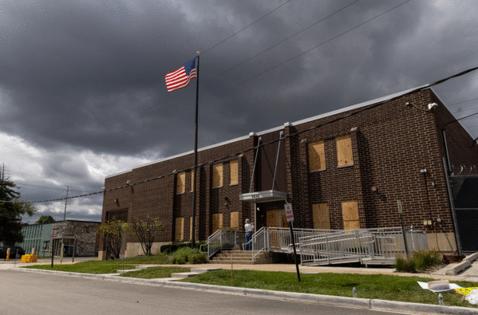Attorneys plan logistics for tour of Illinois ICE facility in Broadview; temporary restraining order to be extended
Published in News & Features
CHICAGO — Attorneys who are alleging inhumane conditions at the U.S. Immigration and Customs Enforcement processing center in Broadview will be able to take photographs, talk to detainees and include a detention expert in an unusual tour of the west suburban facility, which will unfold over four hours on Thursday.
U.S. Magistrate Judge Laura McNally on Friday said she would order the site visit as part of the evidence production process in a class-action lawsuit that was filed last month. The complaint, filed on behalf of former detainees Pablo Moreno Gonzalez and Felipe Agustin Zamacona, accuses Department of Homeland Security officials of proliferating a dirty, overcrowded and unsafe environment amid the Trump administration’s “Operation Midway Blitz.”
The suit also alleges that Broadview detainees have been denied access to counsel and coerced into agreeing to voluntary deportation.
The parties conferred for more than an hour on Wednesday morning to lay out logistics for the site visit, which will offer the judge and participating attorneys a rare look inside the facility, called a “black box” in the complaint.
Also on Wednesday during a separate hearing, the plaintiffs and government attorneys said they agreed to extend the temporary restraining order issued last week by U.S. District Judge Robert Gettleman, which orders DHS officials to provide immigration detainees enough food, water and bed space, among other remedies to improve conditions.
The extension of the restraining order, which was set to expire next week, puts off a showdown over a potential preliminary injunction. Arguments are now scheduled for December.
Meanwhile, government attorneys are working to comply with a fast-moving discovery process, as the plaintiffs seek to depose key officials, review surveillance video and secure documentation that would shed light on many yet unknown facts surrounding the immigration enforcement blitz of the last two months, such as information about detainees who have cycled through the Broadview facility.
Thursday’s site visit is one piece of the overall discovery process, and will include McNally along with an assistant U.S. attorney, five attorneys for the plaintiffs and their expert, Dr. Dora B. Schriro.
Schriro, who was previously special adviser to former Department of Homeland Secretary Janet Napolitano and commissioner of New York City’s correctional department, is a consultant who “regularly conducts inspections of detention and carceral facilities,” according to a status report filed with the court.
The tour will be led by Shawn Byers, ICE deputy field office director in Chicago, according to Assistant U.S. Attorney Jana Brady.
“He’d lead the tour and as you are walking around the facility, he will explain what’s going on, what changes have been made and answer related questions,” Brady said.
One matter at issue: who would take photographs during the visit. Government attorneys wanted an ICE photographer to shoot the photos so that the agency could first review them before turning them over to the plaintiffs.
Objecting to the request, the plaintiffs wrote in a status report that it would allow the government to “limit what may be photographed, to blur or otherwise alter photographs after they are taken, or to delay the disclosure of photographs.”
McNally ruled that the plaintiffs could take their own photos, but the government will be allowed to first review the snapshots to potentially blur sensitive material, such as faces or security locks.
Brady said that the number of detainees at Broadview at any given time is “constantly in flux,” but she said there were around 18 detainees there on Monday afternoon and 22 detainees on Wednesday morning.
During a full-day hearing on conditions at the facility last week, former detainees described instances where around 150 people were crammed into holding cells, leaving little space to try to lie on the floor to sleep. Gettleman’s restraining order, though, now requires that any detainee held overnight be given bedding to be able to lay down and sleep.
“It has really become a prison,” Gettleman said last week following hours of testimony. “The conditions would be found unconstitutional even in the context of prisons holding convicted felons, but these are not convicted felons. These are civil detainees.”
Detainees also testified about not being given enough food and water, as well as overflowing toilets without privacy and no working showers or hygiene products.
Since President Donald Trump’s administration announced the start of “Operation Midway Blitz” on Sept. 8, DHS officials have announced more than 3,000 arrests. Meanwhile, Border Patrol Cmdr. Gregory Bovino, the top official on the ground leading the administration’s efforts, is expected to depart Chicago for another assignment within days, and most of the agents under his command would soon be redeployed elsewhere, sources told the Tribune this week.
_____
©2025 Chicago Tribune. Visit chicagotribune.com. Distributed by Tribune Content Agency, LLC.







Comments